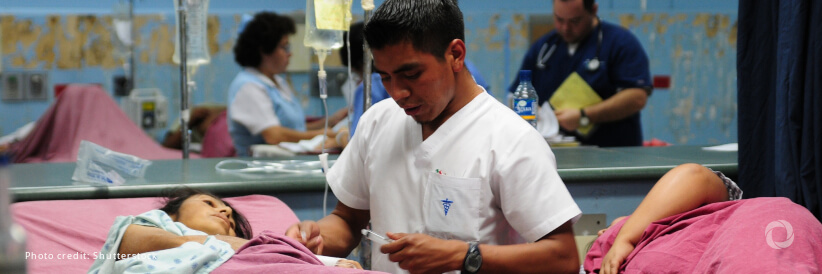The Director of the Pan American Health Organization (PAHO), Dr. Jarbas Barbosa, has called for urgent action to strengthen primary health care as a way to achieve health equity and address persistent gaps in the care of noncommunicable diseases (NCDs) and mental health. He also urged improving access to diagnostics, treatment, and digital tools across the Region of the Americas.
Speaking at the Foreign Policy Global Health Forum, held on the sidelines of the 78th World Health Assembly (WHA78) in Geneva, Dr. Barbosa warned that “35.2% of the population in the Americas faces unmet healthcare needs, with rates exceeding 40% in lower-middle-income countries.”
He underscored the importance of global and regional cooperation to address these gaps, citing PAHO’s recent establishment of the Alliance for Primary Health Care in the Americas (AxAPS) with the Inter-American Development Bank (IDB) and World Bank.
“This initiative mobilizes investments to strengthen primary health care infrastructure and workforce capacity across 15 countries, leveraging global financing mechanisms to address regional inequities,” he said.
Dr. Barbosa emphasized that NCDs were a top priority when he took office in 2023. “I launched the Better Care for NCDs initiative to increase the capacity of primary health care to deliver comprehensive NCD services and strengthen patient monitoring,” he said. He highlighted PAHO’s efforts to improve the diagnosis, treatment, and control of hypertension, diabetes, certain cancers, chronic respiratory diseases, and common mental health conditions such as depression and anxiety.
Yet significant gaps persist: “Only 36% of adults with hypertension are controlled; approximately 38% of adults with diabetes are not adequately treated. Cervical cancer can potentially be eliminated through HPV vaccination, HPV testing, and precancer treatment, all delivered through primary care services. However, coverage rates for HPV vaccination are well below the 90% target, while HPV testing has only been introduced in a few countries,” Dr. Barbosa said.
He also called attention to the growing burden of mental health conditions in the region. “More than 160 million people live with mental disorders in the Americas, most of whom lack access to care and also experience stigma and discrimination.”
To respond to these challenges, PAHO is working with partners such as Resolve to Save Lives, the World Diabetes Foundation, the International Diabetes Federation, GAVI, the Sabin Vaccine Institute, UNITAID, and the Spanish International Cooperation Agency.
Dr. Barbosa also highlighted the PAHO Revolving Fund as a key mechanism for expanding access to quality-assured medicines and technologies.
“We offer HPV vaccines, antihypertensive medications, insulin, metformin, HPV tests, thermal ablation devices, and blood glucose and blood pressure monitoring devices—all at a unique price regardless of purchase size,” he said. “Yet this resource continues to be underutilized in the region. I urge all governments to consider accessing the PAHO Revolving Funds to increase access to NCD medicines and diagnostics.”
Digital health was another area of focus. Dr. Barbosa presented the Pan-American Highway for Digital Health, launched in 2023 with the Inter-American Development Bank, as a cornerstone of PAHO’s digital transformation agenda. Originally developed to support cross-border vaccine certificate exchange during the COVID-19 pandemic, the initiative now serves as a framework for secure, ethical sharing of health data across borders.
“PAHO was the first WHO region to launch a Regional Roadmap for the Digital Transformation of the Health Sector in 2018,” he said. “We recently adopted a new regional resolution to strengthen information systems and digital health through 2030.”
Dr. Barbosa noted that PAHO’s digital health tools are designed to expand access to care across diverse settings.
“Telehealth isn’t just for rural or remote areas,” he said. “In large cities, traffic congestion and overcrowded health services can delay or disrupt care. Digital solutions can help close these gaps by bringing services closer to where people live and work.” The All-in-One Telehealth Platform, for example, is open-source, aligned with international standards, and freely available to countries.
He also emphasized the role of long-term financing, noting that countries in the region are currently investing over US$1.2 billion in national digital health projects aligned with PAHO’s transformation strategy, through partnerships with the IDB, the World Bank, and the Development Bank of Latin America (CAF).
Dr. Barbosa concluded by emphasizing that “digital transformation is a foundational investment for building resilient, inclusive, and future-oriented health systems.”

